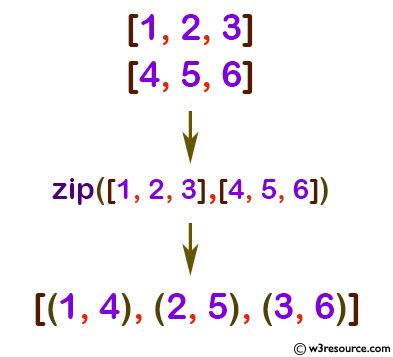Python: zip() function
zip() function
The zip() function is used to make an iterator that aggregates elements from each of the iterables. The iterator stops when the shortest input iterable is exhausted. With a single iterable argument, it returns an iterator of 1-tuples. With no arguments, it returns an empty iterator.
Version:
(Python 3.2.5)
Syntax:
zip(*iterables)
Parameter:
| Name | Description | Required / Optional |
|---|---|---|
| *iterables | Iterator objects that will be joined together. | Required |
Return value:
Returns an iterator of tuples, where the i-th tuple contains the i-th element from each of the argument sequences or iterables.
Example: Python zip() function
x = [1, 2, 3]
y = [4, 5, 6]
zipped = zip(x, y)
print(list(zipped))
Output:
[(1, 4), (2, 5), (3, 6)]
Pictorial Presentation:

Python Code Editor:
Previous: vars()
Next: Python Home
Test your Python skills with w3resource's quiz
